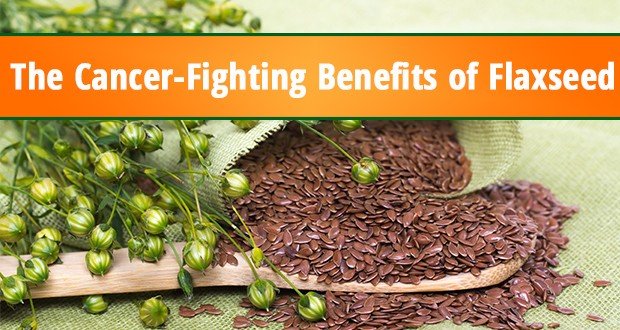By Ty Bollinger

Over the past few years
you’ve likely read or heard that flaxseeds are good for you. You may not
have a clear understanding, however, of the many health benefits of flaxseed and why they play an important role in your anti-cancer diet.
What is Flaxseed?
From the name, you can tell that it
is the seed of the flax plant. Its fibers are woven to make linen fabric
and the oil (referred to as linseed oil) is used in wood finishing.
It’s the seeds, though, that are the
stars of this pretty, ornamental plant. Flaxseed sometimes imparts a
mild, nutty essence when added to food but other ingredients easily
overshadow the taste. This allows you to add it to recipes without
really altering the flavor.
What Makes Flaxseed So Healthy?
Flaxseed has an amazing amount of nutrients and is the best source of plant-based
omega-3 fatty acids. Omega-3 fats are healthy fats shown to reduce
levels of cholesterol in your system. Other sources of omega-3s include
fatty fish and walnuts. Flaxseed also contains nine amino acids that,
when appearing together, make a complete protein like those found in
dairy and meat.
Their high fiber content
(approximately 3 grams per tablespoon), is hugely beneficial to your
overall
digestive health. According to scientists, Americans should be
consuming between 30 to 40 grams of fiber every day. Most people barely
consume half of this suggested daily healthy amount.
What Else Can Flaxseeds Do?
The benefits of flaxseed make it a superfood you need to add to your anti-cancer eating plan.
Ongoing studies like the one at the University of Illinois show that
these sesame seed-sized kernels may prevent serious illness.
Experts believe this is due to the
phytochemicals and phytoestrogens as well as the omega-3 fatty acids
contained within. These compounds working together provide a strong
protective benefit to our bodies.
Top 3 Health Benefits of Flaxseed
- Protection against heart disease. The human body cannot produce omega-3 on its own and you must have an abundance of these valuable compounds for many critical functions. Consuming foods rich in omega-3 reduces the risk of developing cardiovascular issues. Some studies are working to prove that heart disease is reversible. Arterial plaque formation can be slowed and prevented by omega-3. Scientists are currently researching whether or not omega-3 can remove existing plaque buildup. Soluble fiber contained in flaxseed helps “scrub” the body clean of fat-soluble waste and toxic compounds that develop as a result of our body’s metabolic process. The incredible antioxidant properties found in lignans also assist by fighting against the free radicals that cause body-wide inflammation and cellular damage.
- Prevention of osteoporosis. Post-menopausal women are at the greatest risk for loss of minerals, density, and strength of their bones. Findings from a research study at the National Research Center in Cairo, Egypt, show that omega-3 fatty acids present in flaxseed protect the bones and prevent bone demineralization and loss of density.
- Cancer protection. Regular consumption of flaxseed may protect the body from colon cancer, prostate cancer, and breast cancer. Omega-3 fatty acids prevent cancerous cells from latching onto healthy cells. If cancerous tumors attempt to form, the lignans contained in flaxseed stop the formation of new blood supply (anti-angiogenesis) that feeds tumor growth. In other words, they starve the tumor of their supply of oxygen and nutrients. If cancer cells can’t get these basic requirements, they are unable to multiply and spread.
To achieve the most health benefit from flaxseed it is best to use freshly milled or crushed seeds.
This allows your body to efficiently absorb the available nutrients
contained within its tough exterior. The shell is where the fiber
originates so make sure your seeds are milled or processed properly. Flaxseed
oil capsules, available in most health food stores, may not provide the
benefits you’re looking for. Processing removes the crucial lignans and
unless they’re added back to the oil, you won’t get the full benefits
of flaxseed.
Ultimately, you’re better off consuming the seeds themselves. This doesn’t have to be an unpleasant experience! Add a couple of tablespoons of the seeds or powder to a smoothie.
Sprinkle it into your oatmeal for a nutty punch of flavor. You can mix
it into some mashed sweet potato and you’ll never even know it’s there. Just because a cancer-fighting food is healthy doesn’t mean it can’t also taste delicious!
Store the seeds or powder in an
airtight container in the refrigerator or freezer. Because of their high
oil content, they can spoil if kept at room temperature. Consider
buying whole flaxseed in bulk and separating into smaller containers.
Grinding them is simple if you have a coffee grinder at home and only
takes a few quick pulses.
If you are hesitant about the flavor,
you can take a capsule of ground flaxseed with one of your daily meals.
Remember that you need to find ground flax pills not flax oil pills because the oil doesn’t contain the protein or the fiber of the seeds.
Research continues on the benefits of flaxseed and the results look promising. Early studies have proven that it is a valuable addition to a healthy, cancer-free lifestyle. The lignans, phytoestrogens, proteins, and high fiber content all work in conjunction to protect your body.
Discuss any concerns you may have
with your healthcare provider and work together to find the best
combination of nutrients and lifestyle options for you.

No hay comentarios:
Publicar un comentario